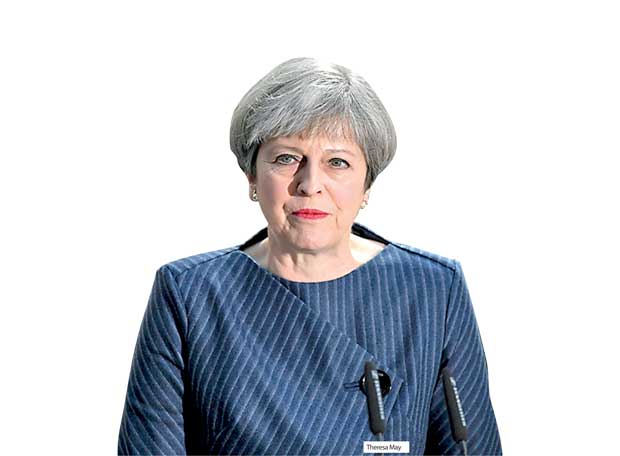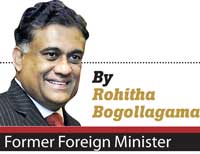Reply To:
Name - Reply Comment
Last Updated : 2024-04-19 08:31:00
The British Prime Minister, Theresa May, announced the parliamentary elections for 8th June 2017 which is now being termed as a “snap election” and further being said, “as a strategic move” in the Brexit trajectory. The Prime Minister’s decision to call for a snap poll, is being viewed as one of surprise. There are several factors that have come to bear heavily on the need for a parliamentary poll in the process of meeting the aftermath of the Brexit .

Britain decided at a referendum held in 2016, to exit from the EU, which cost David Cameron his premiership and which brought about a new government led by Theresa May. She invoked Article 50 under the EU which paves the way for a member state to exit the Union. The general elections now called for, though viewed as a surprise by the general public and in particular the Media, who had been completely kept in total darkness of this move by the Prime Minister, has sent across several lines of contentions and assessments, both in regard to it’s needs and the consequences.
Britain’s next general elections were due in May 2020, in keeping with the legislative requirements in elections having to be held every five years. At the last general election in Britain, David Cameron led the elections both as prime minister and the leader of the Conservative Party, and had a resounding victory over the Labour and the Liberals.
But, in David Cameron’s victory, one major underscore was to offer a referendum to the people, to decide on the British continuity in the EU. Keeping to the pledge, David Cameron campaigned heavily in the platform of Britain - in EU - against which the people decided Britain out of EU. ( BRIT-EXIT). One exemption, and the notable one being the vote in Scotland, where over 60% of the population voted to remain in the EU.
With this backdrop, the people of Brittan comprising England, Scotland, Wales and Northern Ireland are now again facing a poll at the general elections, which will trigger many consequences and create new platforms to address the challenges that are commonly termed as the post BRIT-EXIT scenario.
The main challenge that Britain faces is how best they could manage the process of exiting the EU with the least amount of co-lateral damage to the economy and consolidation of their sovereignty and be insulated from EU immigrational advances and commitments.
The process through which the negotiations will now begin between the British Government and the EU Commissioners will not be one on a bed of roses, and many thorns are likely to surface with a much hostile grouping and a Bureaucracy that takes the interest of EU, as a Union forward. The British referendum did not only make a dent in the EU consolidation, but also made way to a new  sentiment associated with nationalism of individual countries superseding the supremacyof the European Union. The fabric that netted the EU together has been unwoven, and the nationalistic favour is now pricking public sentiments in the political make-up in member states of the European Union.
sentiment associated with nationalism of individual countries superseding the supremacyof the European Union. The fabric that netted the EU together has been unwoven, and the nationalistic favour is now pricking public sentiments in the political make-up in member states of the European Union.
France is facing a presidential election in the coming days and already the far-right leader, Marine Le Pen, one of the leading presidential candidates, is campaigning on a platform of FRENCH -EXIT from the European Union.
Hence Theresa May‘s calculated strategy is one for which she has been mandated, to ensure the peoples mandate at the referendum means British-Exit, and in doing so there should be least damage or loss on Brittan’s co-strengths in the world. Prime Minister May is leading the Conservatives for the first time to the elections in a favourable opinion poll, with a lead of over 20 points over the main opposition, the Labour led by Jeremy Corbyn. Many surprises are possible. In the public perception, there can be diverse issues that may come to the forefront, including the economic, health and welfare issues, as normally found, in any given general election. Even the fact that Conservatives having won two previous elections, and this being the 3rd that they are seeking to be in Government, this too may be a factor having to be addressed, or could trigger surprises.
The Labour party led by Jeremy Corbyn, though perceived to be not popular within his own party members in Parliament, has already announced today, in reaction to the call for general elections, that the Labour welcomes the move. He has been emphatic, on turning the opportunity it offers to the people, to decide based on domestic issues.
The issues highlighted amongst others, including unemployment, lack of public investment in the creation of infrastructure that would support economic growth, the failing of the National Health Service and the conditions of the larger population facing economic hardships, and the appalling educational system, are only a few named by the Labour leader. These are popular issues to build on one’s campaign. The challenge will be for the Government, with a view to ensure a Conservative victory, that some of these key economic issues be dealt with conviction and commitment.
According to Theresa May, she is blaming the divisive nature of the Westminister, as hampering the British role in being able to negotiate with the European Commission and the member states from presidents to prime ministers, and to Chancellors in the European political make-up with strength and conviction. She is naming the Labour party in the post brexit scenario of being destructive, and the Liberal Democrats, as undermining the national interest, and the British Scottish Party as openly stating that they would not accept any Agreement that Brittan would enter into with the EU, as a severance agreement.
That shows the frustration in which the Prime Minister has been placed currently, on one hand having received a mandate from the people to exit and on the other hand, not being able to secure a package which she terms, will consolidate Britain as a stable, independent, and sovereign state with liberty and integrity, to work with the existing friends of Britain and the new partners in the future, for the larger good of Great Britain.
This shows, how much the country, in her own words, and the Parliament in particular, is divided on a national issue that may have far- reaching consequences, both to the country, and to the people, for many more generations.
Therefore it is now important, to look at the timing, whether she is right, in having called for this election and whether it is prudently timed. The next election, going by the fixed term legislation of the United Kingdom, must be held only once in 5 years. If you are to have one before, you need 2/3rd of parliamentary approval. The British House-of-Commons have endorsed such a decision, and the date of 8th June is now confirmed.
If so, the merits of the Prime Ministers call for such an election comes on the very critical factor, not of exiting EU, but how best the country is going to perform on the post EU development. The date on which Britain is to exit the EU will be two years from now, in terms of Article 50 being invoked. This will be around 2019, which will leave only about an year to experience Britain’s new identity, with the new opportunities. But against this process the British Government, is now seeking to prepare the ground, to have the next general election around 2022. This would grant a space of 3 years for the post EU identity of Britain to be consolidated and experimented, so that the people will once again be likely to speak with a greater understanding of a true British profile, much distinguished than that of being a member of the EU.
Therefore the timing has to be considered as just right for the Prime Minister to have taken this decision against which her approach and engagement, both domestically and in the EU context, would be hampered with several divergences. The paradox could only be cured, by getting a mandate from the people that would send a signal, both to the House of Commons, where her leadership would prevail and equally, reach out to the EU, with certainty, continuity and stability. Thus, it may pave the way for negotiations with conviction and strength with EU, and to insulate Britain from adverse fall out. As Prime Minister May states, new economic and trade pursuits could be made from the stand point of a sovereign, supreme, country for greater vistas to be reached.

Add comment
Comments will be edited (grammar, spelling and slang) and authorized at the discretion of Daily Mirror online. The website also has the right not to publish selected comments.
Reply To:
Name - Reply Comment
On March 26, a couple arriving from Thailand was arrested with 88 live animal
According to villagers from Naula-Moragolla out of 105 families 80 can afford
Is the situation in Sri Lanka so grim that locals harbour hope that they coul
A recent post on social media revealed that three purple-faced langurs near t

10 Apr 2024
09 Apr 2024